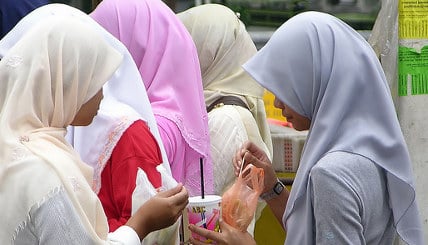Fatima Afif, a nursery assistant was sacked in 2008 by the ‘Baby Loup’ creche for refusing to remove her Muslim headscarf at work. In March this year her dismissal was overturned after an appeal court said it “constituted discrimination based on religious convictions and must be declared invalid.”
That decision was lambasted by many in France, where the wearing of religious symbols or clothing in public (state-run) schools has been illegal since 2004, as “a dark day for secularism”. But Afif's sacking was “invalid” because the crèche was a privately-owned business, rather than a public school. The court of appeal was asked to look again at the case.
And on Wednesday the court of appeal in Paris delivered the verdict those supporters of secularism had been calling for when it upheld the original decision by the nursery.
The appeal court described Afif's refusal to take off the veil as an offence that constituted “gross misconduct” and therefore justified her sacking.
Michel Henry, a lawyer for Afif had previously argued that the crèche’s internal rules should be trumped by “the exercise of a fundamental freedom, the freedom of religion,” he was quoted as saying by French television TF1.
Wednesday's decision is the third setback for Afif after she had had her appeal against the dismissal rejected on two previous occasions.
In 2010 a labour relations board found that her sacking was justified by “blatant and repeated insubordination.”
An appeals court in 2011 agreed, stating that young children in the crèche “should not be confronted by ostentatious displays of religious affiliation.” However Wednesday's decision may not mark the end of the five year court battle as Afif has vowed to take her caseto the European Court of Human Rights.
The decision to oveturn the sacking earlier this year, sparked a debate about whether France's veil ban should be extended to private businesses and universities.
Dominic Baudis, president of the institution Defenseur des Droits called on thegovernment to clarify the law.
“We are asking the government to clarify the 2004 law over the banning of religious symbols, because it is not clear and it needs updating,” he told The Local. “We are asking for clarification between the principle of liberty, laid down in the constitution, and that of the principle of secularism, which is particular to France.”
European judges to rule on full face veil ban
THe Baby Loup decision comes on the same day European judges hear the case of a 23-year-old French woman who claims the country's highly contentious ban on full-face veils violates her rights.
The Strasbourg-based European Court of Human Rights (ECHR) will hear arguments in the case brought by a plaintiff known only by her initials SAS, with a ruling expected in early 2014.
The law, introduced in 2010, bans the wearing of full-face veils like the burqa and niqab, with offenders facing fines of up to 150 euros ($203).
French authorities say the law is needed to protect the country's secular traditions and for security reasons.
But the ban has increased tensions with France's Muslim community, which at an estimated four million is western Europe's largest Muslim minority.
Those tensions have occasionally erupted into violence, including riots in the Paris suburb of Trappes this summer after a man was arrested for allegedly attacking a police officer who stopped his wife over wearing a veil.
In written arguments presented to the court, the plaintiff says she is a “devout Muslim and she wears the burqa and niqab in accordance with her religious faith, culture and personal convictions.”
It claims the ban violates her rights to freedom of religion, freedom of expression, freedom of assembly and a prohibition against discrimination.
After the violences in Trappes Interior Minister Manuel Valls was forced to defend France's ban on the wearing of the full face veil in public.
“The law banning the full-face veil is a law for women… It is not for a second a law against Islam,” Manuel Valls told RTL radio.
“It is a law against practices that have nothing to do with our traditions and our values, and the police did their work perfectly well.”
Belgium and some parts of Switzerland have followed France's lead in banning full-face veils, while similar bans are being considered in Italy and The Netherlands.
Some British politicians called for veil bans in public buildings in September after a judge ruled that a Muslim woman would be allowed to wear a veil in court but would have to take it off while giving evidence at her trial.
European judges are set to deliver their verdict in spring next year.


 Please whitelist us to continue reading.
Please whitelist us to continue reading.
Member comments